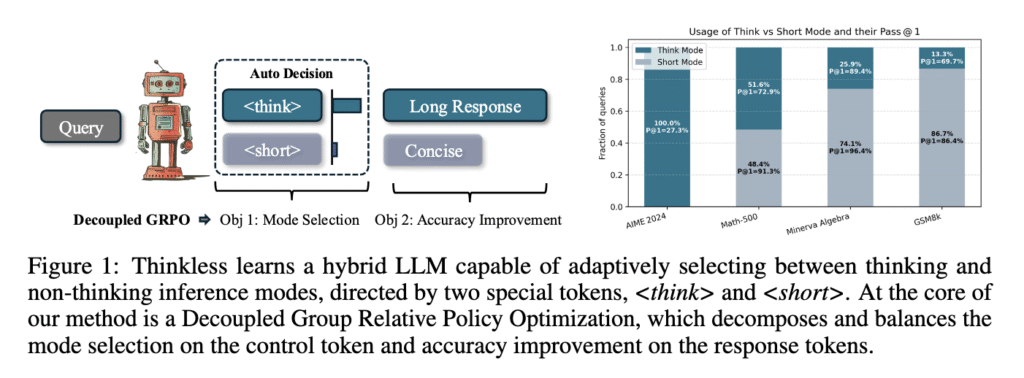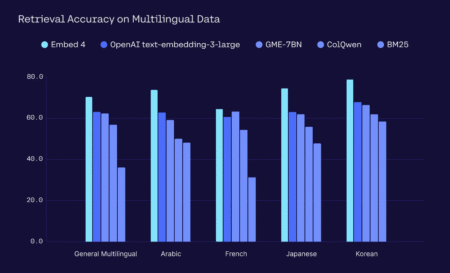The effectiveness of language models relies on their ability to simulate human-like step-by-step deduction. However, these reasoning sequences are resource-intensive and can be wasteful for simple questions that do not require elaborate computation. This lack of awareness regarding the complexity of the task is one of the core challenges in these models. They often default to detailed reasoning even for queries that could be answered directly. Such an approach increases token usage, extends response time, and increases system latency and memory usage. As a result, there’s a pressing need to equip language models with a mechanism that allows them to make autonomous decisions about whether to think deeply or respond succinctly.
Current tools attempting to solve this issue either rely on manually set heuristics or prompt engineering to switch between short and long responses. Some methods use separate models and route questions based on complexity estimates. Still, these external routing systems often lack insight into the target model’s strengths and fail to make optimal decisions. Other techniques fine-tune models with prompt-based cues like “reasoning on/off,” but these rely on static rules rather than dynamic understanding. Despite some improvements, these approaches fail to enable fully autonomous and context-sensitive control within a single model.
Researchers from the National University of Singapore introduced a new framework called Thinkless, which equips a language model with the ability to dynamically decide between using short or long-form reasoning. The framework is built on reinforcement learning and introduces two special control tokens—<short> for concise answers and <think> for detailed responses. By incorporating a novel algorithm called Decoupled Group Relative Policy Optimization (DeGRPO), Thinkless separates the training focus between selecting the reasoning mode and improving the accuracy of the generated response. This design prevents the model from falling into one-dimensional behavior and enables adaptive reasoning tailored to each query.
The methodology involves two stages: warm-up distillation and reinforcement learning. In the distillation phase, Thinkless is trained using outputs from two expert models—one specializing in short responses and the other in detailed reasoning. This stage helps the model establish a firm link between the control token and the desired reasoning format. The reinforcement learning stage then fine-tunes the model’s ability to decide which reasoning mode to use. DeGRPO decomposes the learning into two separate objectives: one for training the control token and another for refining the response tokens. This approach avoids the gradient imbalances in earlier models, where longer responses would overpower the learning signal, leading to a collapse in reasoning diversity. Thinkless ensures that both <short> and <think> tokens receive balanced updates, promoting stable learning across response types.
When evaluated, Thinkless significantly reduced long-form reasoning while preserving high accuracy. On the Minerva Algebra benchmark, the model used the <think> token in only 25.88% of cases while achieving 94.59% accuracy. In contrast, conventional reasoning models had to use extended chains of thought much more frequently. On the AIME 2024 dataset, Thinkless reached a 27.33% accuracy rate with 100% usage of the reasoning mode, showing that it could maintain performance when full reasoning was necessary. On the GSM8K dataset, it utilized <think> only 13.31% of the time, yet still achieved 84.18% accuracy. These results reflect the model’s ability to handle simple and complex queries with appropriate reasoning depth, cutting down on unnecessary token generation by as much as 90% in some tasks.
Overall, this study from the National University of Singapore researchers presents a compelling solution to the inefficiencies of uniform reasoning in large language models. By introducing a mechanism that enables models to judge task complexity and adjust their inference strategy accordingly, Thinkless optimizes both accuracy and efficiency. The method balances depth of reasoning and response precision without relying on fixed rules, offering a data-driven approach to more intelligent language model behavior.
Check out the Paper and GitHub Page. All credit for this research goes to the researchers of this project. Also, feel free to follow us on Twitter and don’t forget to join our 95k+ ML SubReddit and Subscribe to our Newsletter.
The post Researchers from the National University of Singapore Introduce ‘Thinkless,’ an Adaptive Framework that Reduces Unnecessary Reasoning by up to 90% Using DeGRPO appeared first on MarkTechPost.
Source: Read MoreÂ


